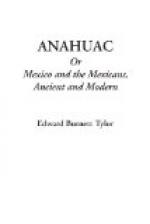We met with no “novelty,” though, when we looked out of the window in the early dawn and spied three men with muskets, following us at a short distance, we thought our time had come, and watches and valuables were plunged into boots and under seats, and through slits into the padding of the diligence; but the three men came no nearer, and we supposed them to be an escort of soldiers. When it was light the difficulty was to recover the valuables—no easy matter, so securely had they been hidden.
We heard afterwards of a little peculiarity which distinguished the robbers of Huamantla. It seems that no less a personage than the parish priest was accustomed to lead his parishioners into action, like the Cornish parson in old times when a ship went ashore on the coast. What has become of his reverence since, I do not know. He is very likely still in his parish, carrying on his double profession, unless somebody has shot him. I wonder whether it is sacrilege to shoot a priest who is also a highwayman, as it used to be to kill a bishop on the field of battle.
We are at last on the high lands of Mexico, the districts which at least three different races have chosen to settle in, neglecting the fertile country below. A sharp turn in the road brings its fairly out into the plain; and then on our left are the two snowy mountains that lie at the edge of the valley of Mexico, Popocatepetl and Iztaccihuatl, famous in all Mexican books. Like Orizaba of yesterday, they seem to rise from the plain close to us; and from the valley between them there pours down upon us such a flood of icy wind, that, though windows are pulled up and great-coats buttoned round our throats, we shiver piteously, and our teeth fairly chatter till we get out of the river of cold air; and then comes hot sunshine and dust again.
Anxious to make sure that we have really got into the land of Aztec civilization, Mr. Christy gets down from the diligence, and hunting about for a few minutes by the road-side, returns in triumph with a broken arrowhead of obsidian. A deep channel cut by a water-course gives us our first idea of the depth of the soil; for these plateaus were once nothing but deep hollows among the mountains, which rain and melted snow, bringing down fragments of porphyry and basalt—partly in their original state and partly decomposed—have filled up and formed into plains. Signs of volcanic action are abundant. To say nothing of the two great mountains we have just left behind, there is a hill of red volcanic tufa just beyond us; and still further on, though this is anticipating, our road passes over the lava-field at the foot of the little volcano of Santa Barbara.
There is a population here at any rate, village after village; and between them are great plantations of maize and aloes; for this is the district where the best pulque in Mexico is made, the “llanos de Apam.” It is the Agave Americana, the same aloe that is so common in southern Europe, where indeed it flowers, and that grows in our gardens and used to have the reputation of flowering once in a hundred years. I do not exaggerate when I say that we saw hundreds of thousands of them that day, planted in long regular lines. Among them were walking the Indian “tlachiqueros,” each with his pigskin on his back, and his long calabash in his hand, milking such plants as were in season.




